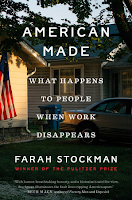I first heard of Farah Stockman's "American Made: What Happens to People When Work Disappears" (Random House 2021) when she was interviewed by Aaron Renn on his podcast here. I ordered a copy of the book the next day. It's taken me over a month to finish it, not because it was a hard read--it's very engaging and well-written--but because, well, it's summer and lots of stuff has been happening.
Following the 2016 election and for several years after, Stockman, a reporter (and now member of the editorial board) for the New York Times spent extended stretches of time in Indianapolis following the lives of several of the employees of Rexnord, a leading manufacturer of steel bearings. Three weeks before the election, Rexnord announced that it was moving its manufacturing equipment to Mexico. Not only would hundreds of workers ultimately lose their jobs, but they would also be required to train the Mexican workers who would replace them.
At the outset, Stockman observed that
Work matters. Too often, those who champion the working class speak only of social safety nets, not the jobs that anchor a working person's identity. ... Jobs matter. For better or for worse, work provides an essential context of our lives; it contributes to our perceptions of ourselves and our expectations for our children. ... It formulates who we are, who we meet, who we marry, and who cries at our graves after we die. (9-10)
Despite her elite familial and educational pedigrees, and notwithstanding working at the pinnacle of America's print media, Stockman does an eminently fair job of describing the individual lives and enormous personal struggles of several soon-to-be-displaced Rexnord employees. Just how elite?
Despite their differences, [Rexnord employees] Shannon, Wally, and John had a lot in common that they didn't have in common with me: They were grandparents in their forties. (I gave birth to my daughter at forty-two.) They smoked or chewed some form of tobacco. (No one in my social circle did.) John and Wally were both proud gun owners, like the men in Shannon's life. (I didn't know a single person in Cambridge who owned a gun that shot anything but glue.) ... They had friends or family members who had served in the military. (No one I spoke to on a daily basis had ever put on the uniform.) Perhaps most crucial of all .. none had graduated from a four-year college. (Nearly everyone in my immediate circle of family and friends had not only a bachelor's degree but a master's degree, PhD, JD or MD.) (162-163)
Just how fair? Her straightforward account of Wally's coming to faith in Christ while watching a preacher on television and her excoriation of NAFTA are two examples. Nor does Stockman sugar-coat the series of poor life decisions notably made by Shannon and Wally. While life constrained the opportunities of many of her subjects, Stockman does not infantilize them; they exercised agency.
Exceptionally fair-minded, that is, until the final chapter set in the context of the trifecta of COVID, the death of George Floyd, and the 2020 election. It's not that her opinions of many aspects of Trump's presidency are wrong, it's that Stockman was caught up in the hype surrounding COVID (recall that the book was published in October 2021, which means that she had finished her manuscript early that year when the negative effects of many COVID policies were not yet widely appreciated) and loses some of her grip.
In any event, I highly recommend American Made. It is an excellent and intimate account of the lives of those for whom the deindustrialization of America is not some exotic tale. Stockman situates the appeal of Donald Trump to many of American's "deplorables," an appeal that continues to reverberate in 2024.





No comments:
Post a Comment